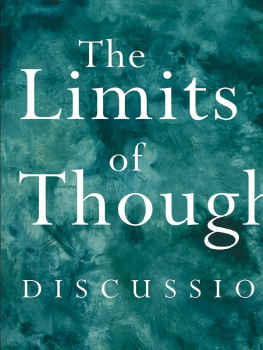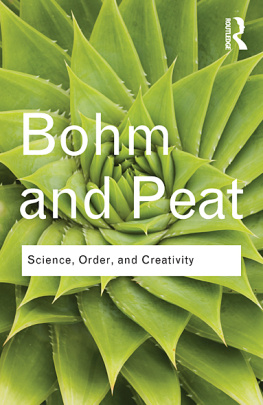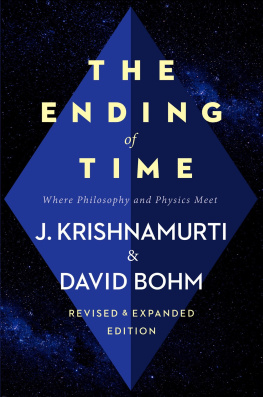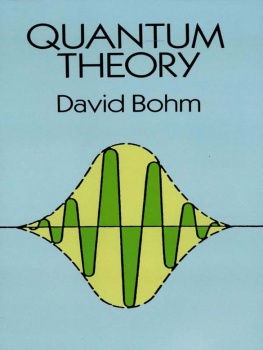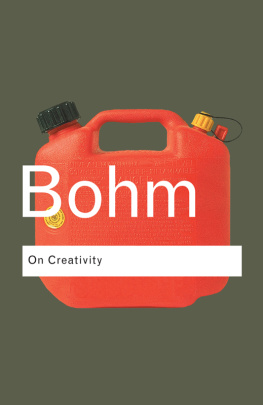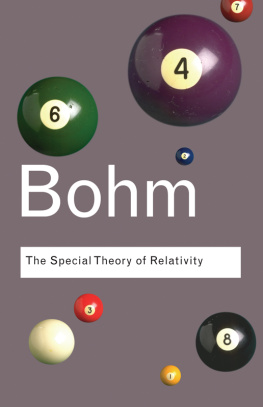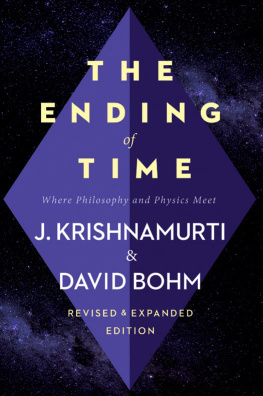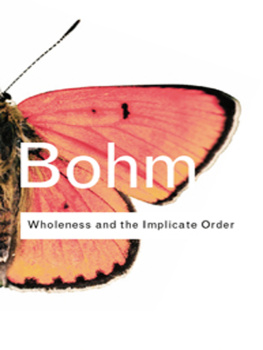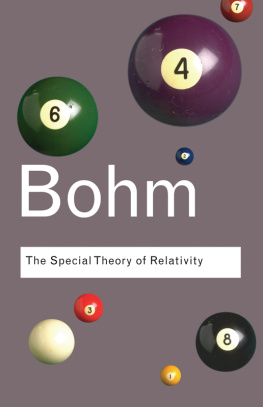For some years David Bohm was a Trustee of the Krishnamurti Foundation and of Brockwood Park, the international school in Hampshire founded by Krishnamurti. From Brockwoods beginnings in 1969 almost until he died in 1992, David Bohm, at Krishnamurtis request, was vitally involved in the work of the school.
Some of the deep and sustained dialogues between Krishnamurti and David Bohm have been made available in publications and recordings. Those which comprise this collection, The Limits ofThought, shed further light on their challenging explorations of the nature of consciousness and the condition of humanity.
Preface
An introduction to Krishnamurtis work
My first acquaintance with Krishnamurtis work was in 1959 when I read his book The First and Last Freedom. What particularly aroused my interest was his deep insight into the question of the observer and the observed. This question had long been close to the centre of my own work as a theoretical physicist who was primarily interested in the meaning of the quantum theory. In this theory, for the first time in the development of physics, the notion that the observer and the observed cannot be separated has been put forth as necessary for the understanding of the fundamental laws of matter in general. Because of this, as well as because the book contained many other deep insights, I felt that it was urgent for me to talk with Krishnamurti directly and personally as soon as possible. And when I first met him on one of his visits to London, I was struck by the great ease of communication with him, which was made possible by the intense energy with which he listened and by the freedom from self-protective reservations and barriers with which he responded to what I had to say. As a person who works in science I felt completely at home with this sort of response, because it was in essence of the same quality as that which I had met in contacts with other scientists with whom there had been a very close meeting of minds. And here I think especially of Einstein, who showed a similar intensity and absence of barrier in a number of discussions that took place between him and me. After this, I began to meet Krishnamurti regularly and to discuss with him whenever he came to London.
We began an association which since then has become closer, as I became interested in the schools which were set up through his initiative. In these discussions, we went quite deeply into many questions which concerned me in my scientific work. We probed into the nature of space and time, and of the universal, both with regard to external nature and with regard to mind. But then we went on to consider the general disorder and confusion that pervades the consciousness of mankind. It is here that I encountered what I feel to be Krishnamurtis major discovery. What he was seriously proposing is that all this disorder, which is the root cause of such widespread sorrow and misery, and which prevents human beings from properly working together, has its root in the fact that we are ignorant of the general nature of our own processes of thought. Or, to put it differently, it may be said that we do not see what is actually happening when we are engaged in the activity of thinking. Through close attention to and observation of this activity of thought, Krishnamurti feels that he directly perceives that thought is a material process which is going on inside of the human being in the brain and nervous system as a whole.
Ordinarily, we tend to be aware mainly of the content of this thought rather than of how it actually takes place. One can illustrate this point by considering what happens when one is reading a book. Usually, one is attentive almost entirely to the meaning of what is being read. However, one can also be aware of the book itself, of its constitution as being made up out of pages that can be turned, of the printed words and of the ink, of the fabric of the paper, etc. Similarly, we may be aware of the actual structure and function of the process of thought, and not merely of its content.
How can such an awareness come about? Krishnamurti proposes that this requires what he calls meditation. Now the word meditation has been given a wide range of different and even contradictory meanings, many of them involving rather superficial kinds of mysticism. Krishnamurti has in mind a definite and clear notion when he uses this word. One can obtain a valuable indication of this meaning by considering the derivation of the word. (The roots of words, in conjunction with their present generally accepted meanings, often yield surprising insight into their deeper meanings.) The English word meditation is based on the Latin root med, to measure. The present meaning of this word is to reflect, to ponder (i.e. to weigh or measure), and to give close attention. Similarly, the Sanskrit word for meditation, which is dhyana, is closely related to dhyati, meaning to reflect. So, at this rate, to meditate would be to ponder, to reflect, while giving close attention to what is actually going on as one does so.
This is perhaps what Krishnamurti means by the beginning of meditation. That is to say, one gives close attention to all that is happening in conjunction with the actual activity of thought, which is the underlying source of the general disorder. One does this without choice, without criticism, without acceptance or rejection of what is going on. And all of this takes place along with reflections on the meaning of what one is learning about the activity of thought. (It is perhaps rather like reading a book in which the pages have been scrambled up, and being intensely aware of this disorder, rather than just trying to make sense of the confused content that arises when one just accepts the pages as they happen to come.)

